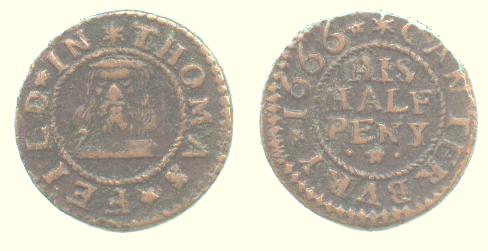
KENT TOKENS |
Ken Elks Copyright
ã 2001During the mid-17th century, due to a shortage of official coins, halfpenny and farthing tokens were
issued to facilitate small change.
Known examples from Kent include:
William Botting, 1669
Samvell Wood, 1666, Saracen's Head
Alixander Holmsby, 1658
William Waldron, chandler
Iohn Eve, grocer
Tho Naker, 1667
Iohn Cardon, baker, 1656
Henrey or Henry Carpenter, 1658 and 1667
Iames Cheever, 1657 and 1663
Thomas Enfield, grocer, 1666 (Mayor of Canterbury 1674)
Anthony Fagg, grocer, no date

Thomas Feild, 1666 (photo above)
Edward Fray, 1667
Thomas Hutten, pewterer 1667
Thomas Ienynges, grocer, circa 1660
Francis Maplisden, 1666 (hops)
Walter Maplisden, no date
Ieremiah Masterson, no date
Tho Mayne, grocer 1654
Thomas Ockman, no date
Richard Smith, grocer, no date
Sibb Smith near the Westgate, no date
Richard White, barber/surgeon 1656
Jarvise Wilmatt, 1664 (horse)
EW, at the Three Kings
Thomas Chapman, 1666, at Ye Red Lion
Robert Dier
William Hardin
Iohn Ieffery
Richard Ien (Jennings?), 1668
James Odden, Grocer, 1664
William Plumer, grocer
William Wacher
William Huish
Iames Coston, James Cotten, 1653
Iohn Pittock, 1663
Moyses Potter, baker, no date
Peter Underwood, candlemaker, no date
Iohn Watts, 1664
John Clouch, 1658 (wheatsheaf)
John Lines, weaver, 1668
NL, At the King's Head, 1649
Iames Watters
DMN, At the French Arms, 1656
No name, At the Leopoldus, Dover, 1651
IC, At the Queene of Bohemia, no date
David Adamson, 1657
John Brian, 1652
Thomas Fidge, at the Mayden Head
Martha Fford, 1659
Katheren Gardner, chandler, 1667
Tho(mas) Kite, 1685 (boat)
Pines Kite, baker, 1670
Thomas Sharnal, 1658
William Tillit, 1662
William Wellard, At the Cock Rose, Dover, no date
Will ManyRinge (Mannering, Mainwaring), haberdasher
William Partridge, grocer
George Allen, 1666 (Mayor of Faversham in 1680)
William Buck, 1669 (stag)
Robert Hogben, vintner, no date
William Knight, grocer, 1666
Poare Ned, 1667
Francis Waterman, mercer, no date, (Mayor of Faversham 1665 and 1681)
Edward Frankline, no date
John Austen, mercer, no date
Matthew Butler, 1668
Thomas Hill, no date
Marck Medhoust, mercer
Iacob Parson, 1651
John Watson, 1653
EB, At the George, no date
Thomas Colton, 1667
John Ellis, (sugar loaf)
Thomas Foster, 1667
Thomas Tuder
Robrt Hovenden, grocer, no date
William Adcock, 1657
Ion Bassett, grocer, 1670
John Wagghorne, mercer, 1666
Thomas Bond, 1666
Rob Brooke, ironmonger 1670
Robert Heath, grocer
James Ruse, grocer, no date
Ionathan Troughton, grocer, 1668
Richard Walker, grocer,1658
Ralph Warde, 1656
Elizabeth Webb, grocer, no date
Steven Weeks, weaver, no date
Richard Wicking, grocer, no date
James Wolba, Wolball or Wolbo, grocer, 1664
Richard Chambers, 1667 (fleur-de-lis)
Christow Houdgben, merchant, no date
Ioseph Iewell, 1669
Joseph Mackrith, no date (sugar loaf)
Anthony Sifflet
Willam Bissy, mercer, circa 1660
Richard Henman
George Ollevera, no date (sugar loaf)
George Reeve, grocer, 1667
Iohn Dyer
Richard Baker, grocer, no date
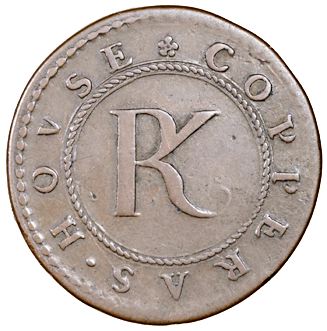
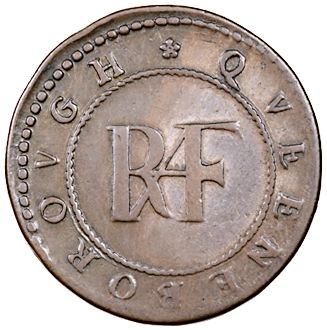
Roger Kemp and Ralph Farr, Coperras House, no date
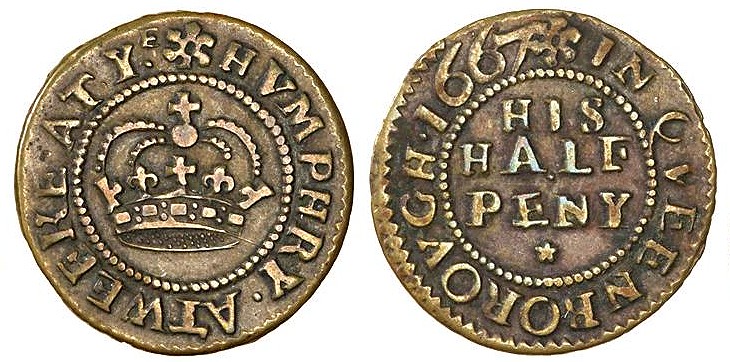
Humphry Atweeke, 1667
Thomas Norrington
Richard Poley, grocer, 1666
Richard Langley, chandler, 1657
Clement March, 1658 (cheese knife)
Hen(ry) Noldred, tobacconist, no date
William Campian, 1658
Robert Churchell, merchant tailor, 1669
Alice Cobham, 1651
John Cobham, 1666
Thomas Palmer, no date (still)
Ioseph Travers, tobacconist, 1666
Gilbert Young, grocer, 1664
Richard Asherniden, no date
Ann Atkins, carnation widow, 1667
Iohn Casbe
Thomas Kingsford, postmaster, no date
Danill Pichley, 1656
Ralph Robins, 1655 (boat)
William Allen, grocer
John Milway, next The Crown
Philip Ewer, 1652
Hennere Figgest, 1654
Anth. Lovell, 1668
Thomas Iohnson, grocer, 1650
James Mead, 1667
William Freeman, tobacconist, 1667
William Overey, 1669
Stephen Putland, 1666
Samvell Dalling, 1653
John Wraighte, 1668
John Solley
John Coulter, grocer, 1652
Thomas Dan, weaver, 1652
Richard Whittingham, 1667
Gabriel Couchman, grocer, no date
During the latter half of the eighteenth century, the copper coinage of Britain had been much neglected. The shortfall in legal tender was made up by millions of imitations. The penny was still made of silver but so small that it was easily lost. The issue of halfpence and farthings was spasmodic and forgeries so rife they made up two-thirds of any change given. The first of the provincial tokens were issued by the Parys Mines Company of Anglesey. That was in 1787. Each carried the legend, "We promise to pay the bearer on demand ..." with a value of one penny or half penny depending on the denomination.
The success of the Anglesey tokens encouraged other tradesmen to follow suit and between 1789 and 1797 tokens were issued throughout the whole of Britain. With the advent of the Matthew Boulton recoinage of 1797, the token coinage ceased, having served its purpose to good effect.
In Kent tokens were issued from most of the major towns, Canterbury, Deal, Deptford, Dover, Faversham (Feversham on the coins), Maidstone, Sandwich and Tenterden, all bearing the names of local tradespeople. In addition, tokens were issued from much smaller places, Appledore, Benenden, Brookland, Dymchurch (spelt Dimchurch on the coins), Goudhurst, Hawkhurst, Hythe, Lamberhurst, (New) Romney and Staplehurst. In Dalton and Hamer's catalogue "The Provincial Token Coinage of the 18th Century" they also list tokens for Gravesend, Folkestone and Stone (Stone in Oxney) and another one for Dover, but these were specially made for collectors and do not bear the name of a tradesman. In addition, they include a medal from Orpington, commemorating an action taken to prevent the spread of disease in horses, and hop tokens from Godington issued by John Toke.
One of the attractions of these provincial tokens is the strong local themes employed in the designs. Those from Kent are no exception. The token for Appledore depicts a windmill, those of Canterbury the cathedral, and Padsole Paper Mill is shown on one of the Maidstone tokens. Deal, and Dover show contemporary ships, Faversham, Hythe, Romney and Sandwich medieval sloops. Allusion to local industry include hops (Lamberhurst), a wheatsheaf (Benenden) and a brewer's dray (Tenterden). Other designs include the Kentish horse on tokens from Brookland, Goudhurst, Hawkhurst and Staplehurst.
The names of local tradespeople responsible for issuing the coins was usually impressed into the rim.
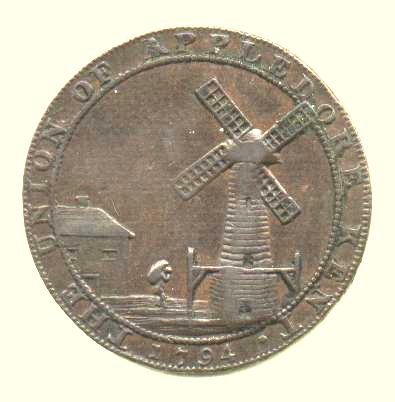
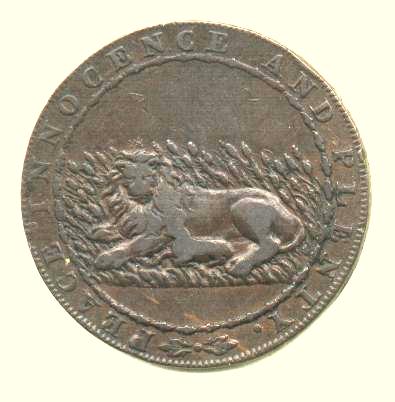
APPLEDORE 1794 "Payable at W. Peckham's Appledore" DH 3
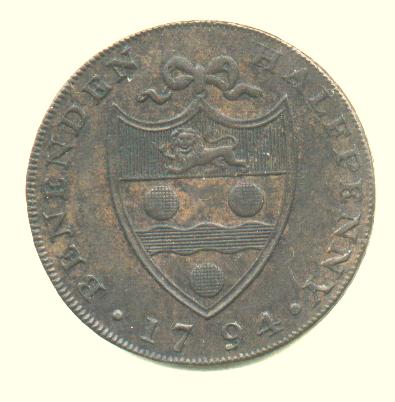
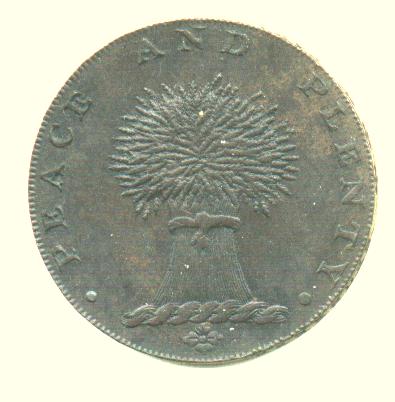
BENENDEN 1794 "Payable Thomas Reeves Benenden" DH 4
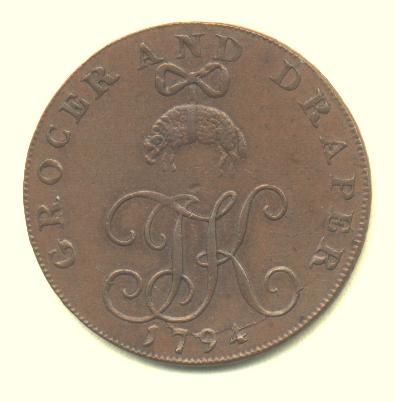
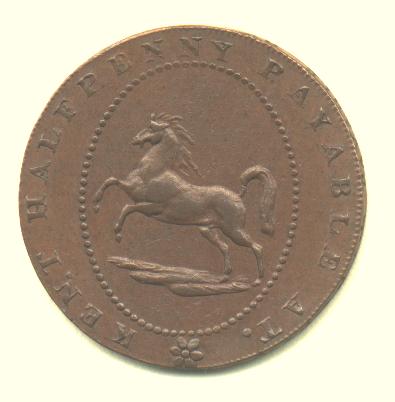
BROOKLAND 1794 "Thomas King's Brookland, Grocer and Draper" DH5
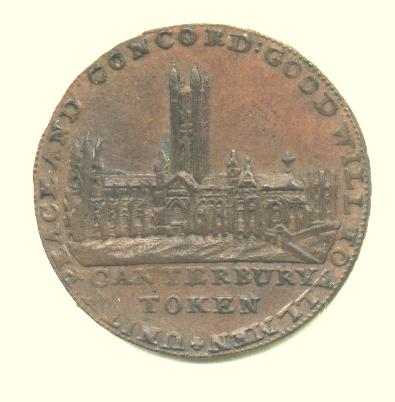
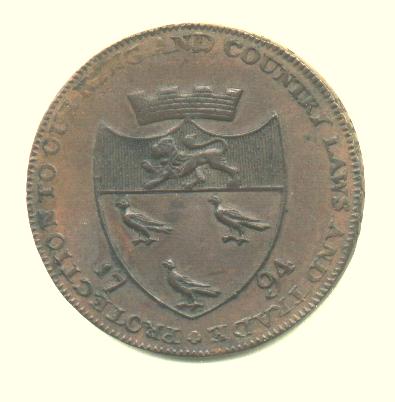
CANTERBURY 1794 "Payable at John Mathews" DH6
CANTERBURY 1794 Same as previous but "Payable at James Robertsons" DH7
(not illustrated)
CANTERBURY 1795 "E.P" (Edward Pillou, tailor) DH 8-10
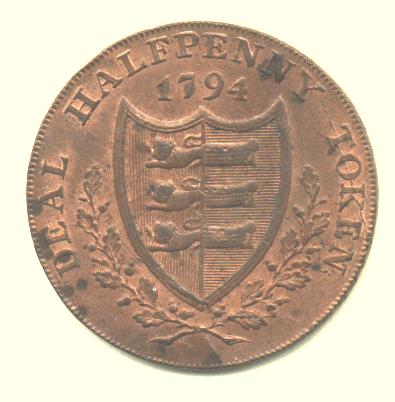
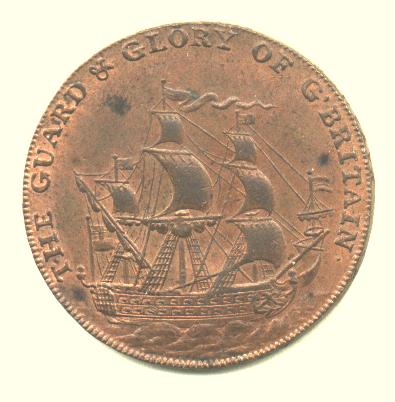
DEAL 1794 "Payable at Richard Long's Library" DH11
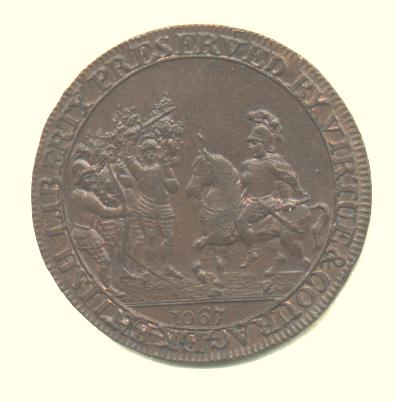
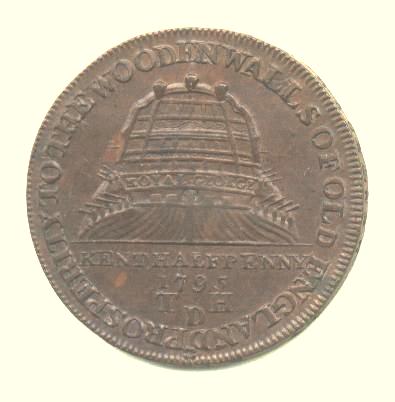
DEPTFORD 1795 "Payable at Tho's Haycrafts Deptford" (ironmonger) DH 12-14
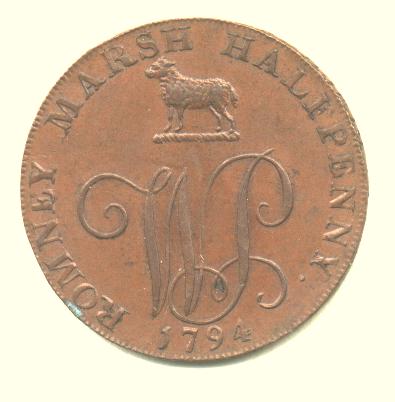
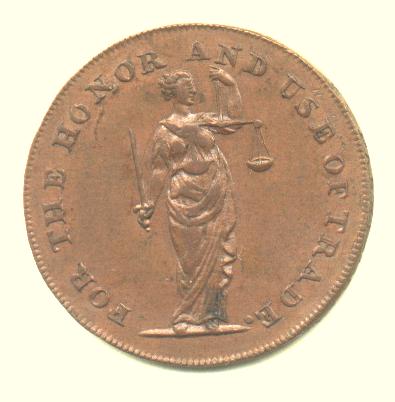
DIMCHURCH 1794 "Payable at W. Parris Dimchurch" DH15
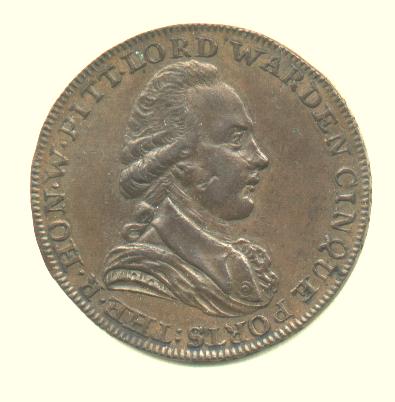
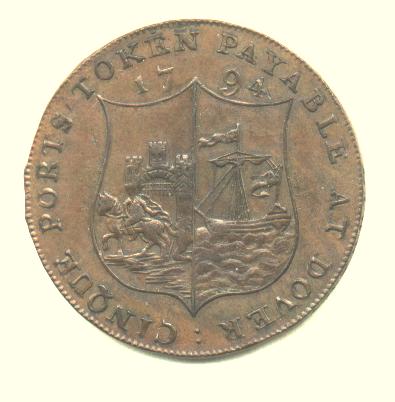
DOVER 1794 "...payable at Dover" "at Horn's Library" (possibly John Horn, Apollo Circulating Library) DH16
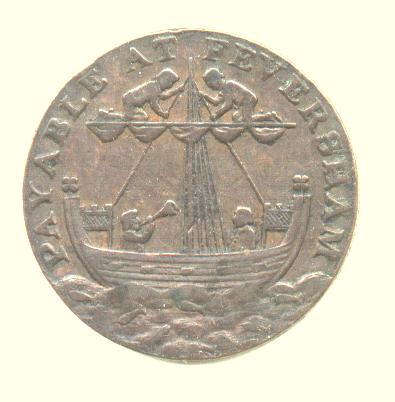
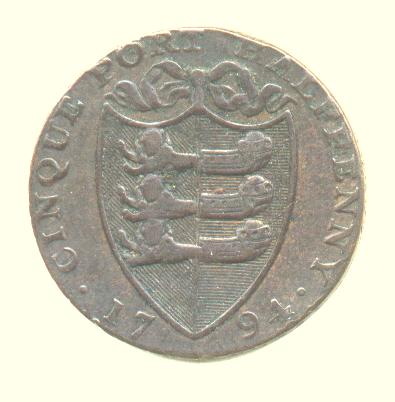
FEVERSHAM 1794 "Payable at John Crowss Copper Smith" DH20
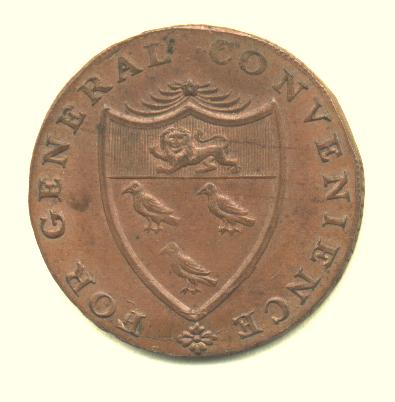
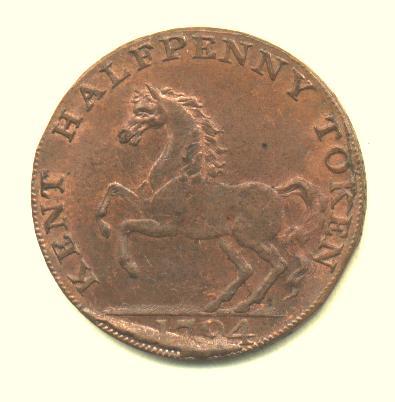
GOUDHURST 1794 "Payable at W. Fuggles Goudhurst" (tallow chandler) DH 28
Note the prominent die flaw through the date in the exergue.
GOUDHURST 1794 Same as previous above but "Payable at W. Myns Goudhurst" (shopkeeper) DH29
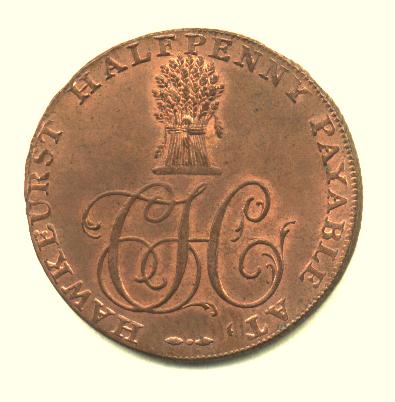
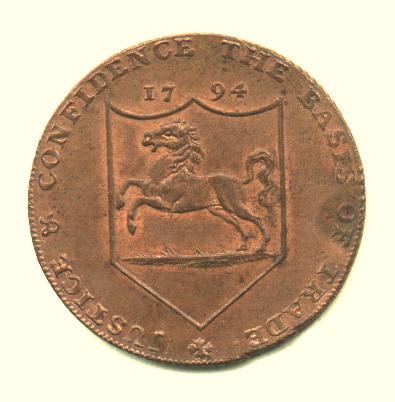
HAWKHURST 1794 "Charles Hider's"
DH 30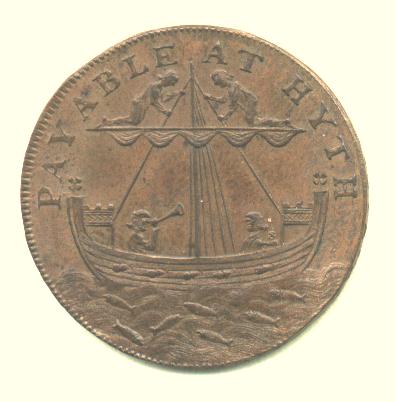
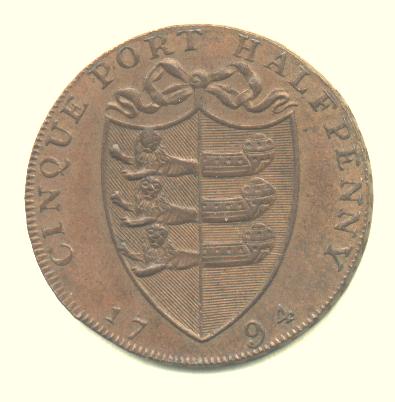
HYTHE 1794 "Payable at Hyth" "At Richard Shipden's" DH31
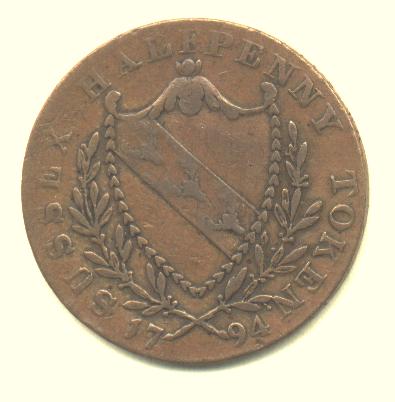
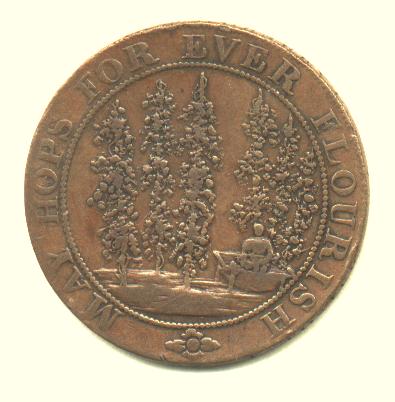
LAMBERHURST 1794 "Payable at T. Foster Lamberhurst" (Thomas Foster) DH32
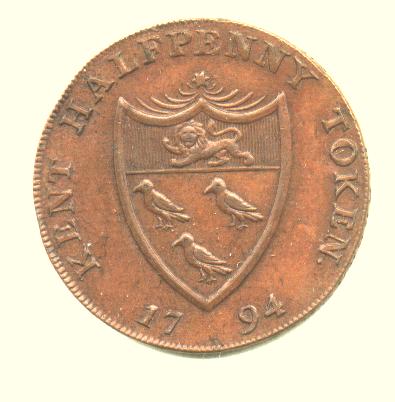
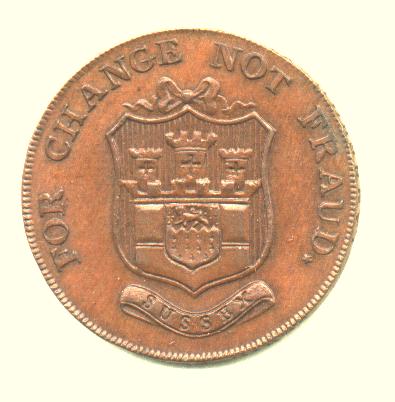
LAMBERHURST 1794 "Payable at I.Gibbs Lamberhurst" DH35
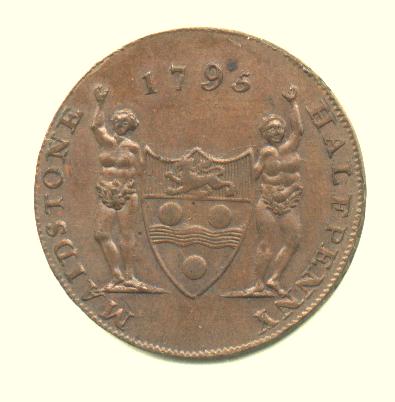
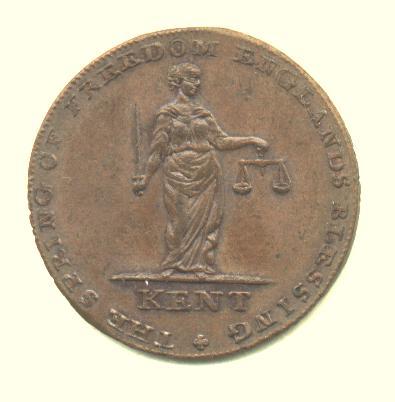
MAIDSTONE 1795 "Payable at Henry Olivers" (cutler) DH36
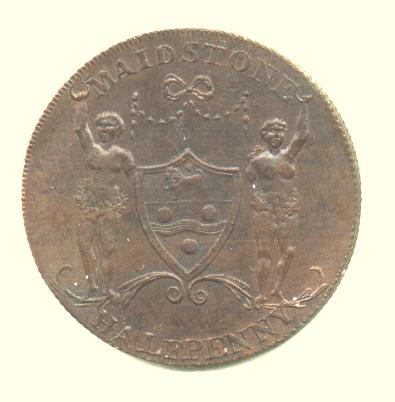
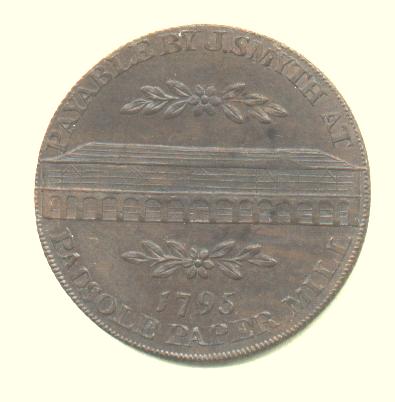
MAIDSTONE 1795 "Payable by J. Smyth at Padsole Paper Mill" DH37
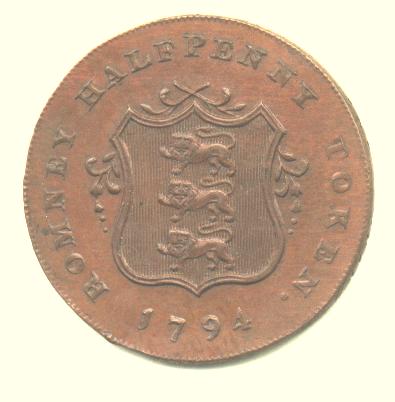
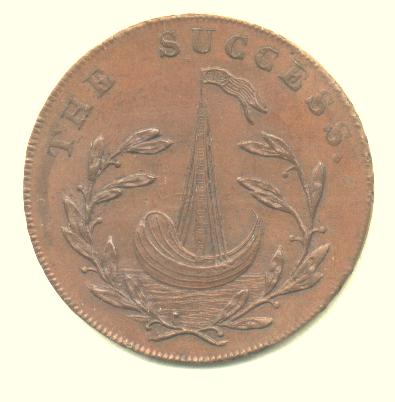
ROMNEY 1794 "Payable at John Sawyer's Romney" (carpenter and joiner) DH38
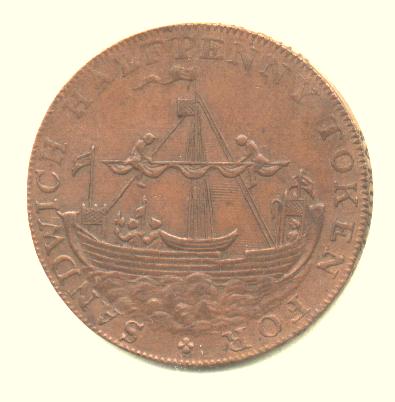
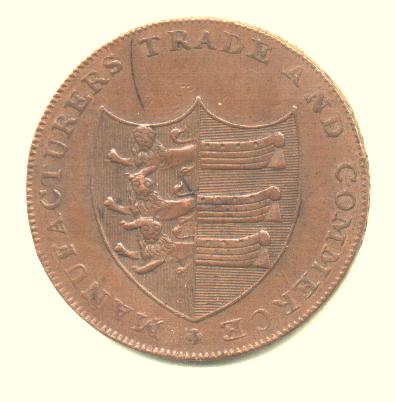
SANDWICH (no date) "Payable at Thomas Bundocks" (weaver) DH39
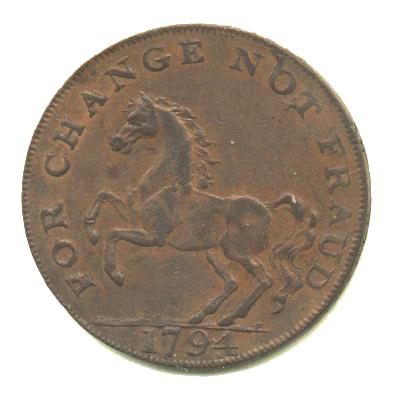
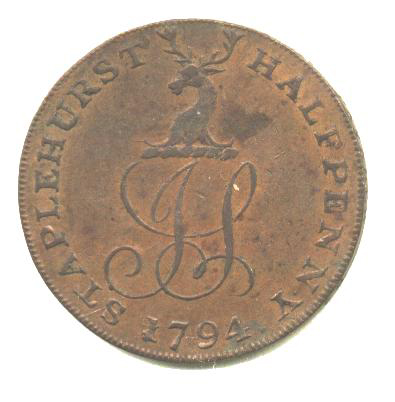
STAPLEHURST 1794 "Payable at I: Simmons Staplehurst" (tallow chandler) DH40
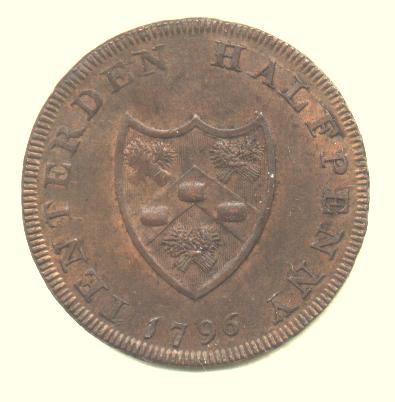
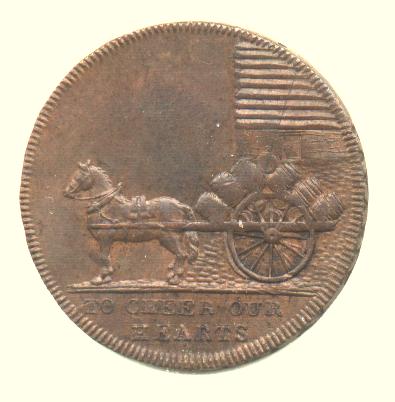
TENTERDEN 1796 "Payable at I & T Cloakes Brew House" DH42
Note: Occupations etc. given in parentheses are those identified by Dalton & Hamer in their research and do not appear on the coins.
19th Century Tokens
During the early 19th century there was a shortage of official coins in both silver and copper. Inadequate supplies of pennies, following the reforms of 1806, led to a fresh output of unofficial tokens. In silver the situation was even worse. The last shillings and sixpences for George III had been minted in 1787 and then only after a gap of 20 years. As a result silver tokens were issued. One of these was by John Boxer of Folkestone.
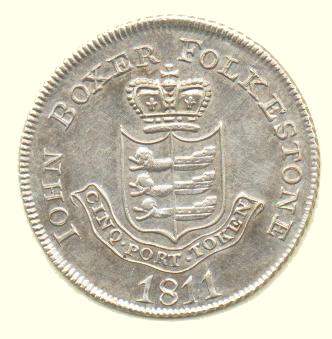
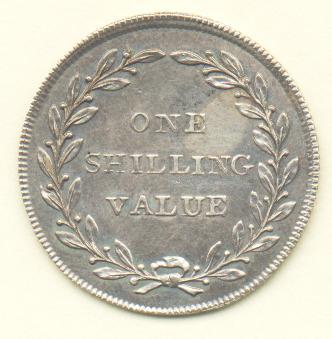
Folkestone silver one shilling token issued by John Boxer